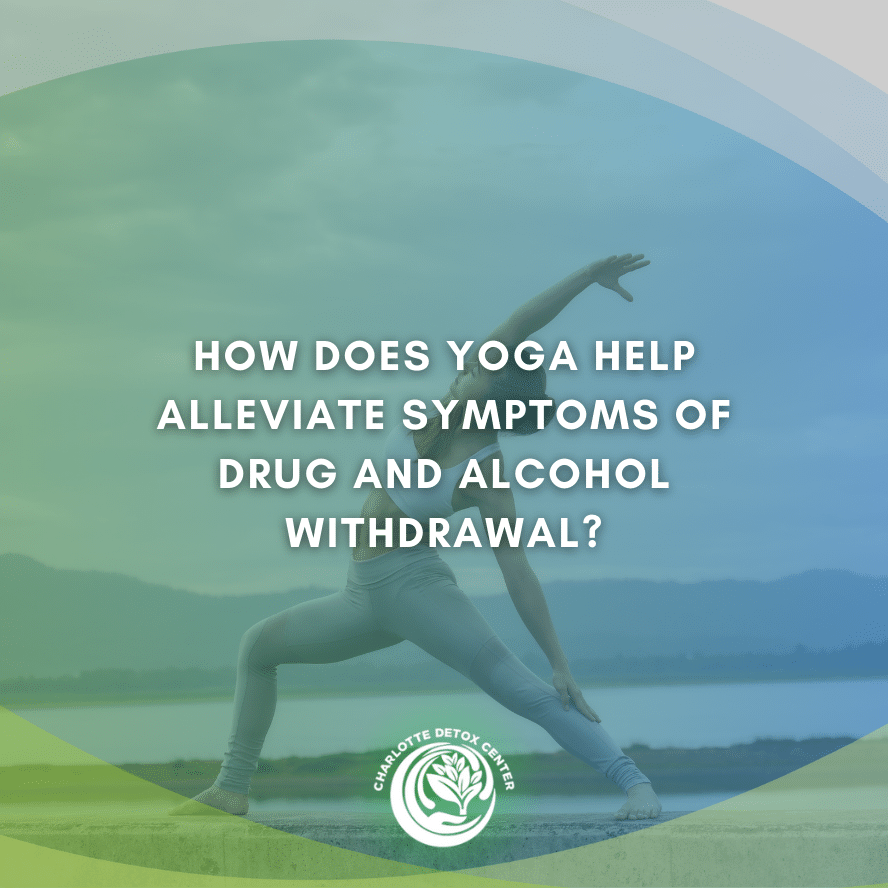How Does Yoga Help Alleviate Symptoms of Drug and Alcohol Withdrawal?

Medically Verified: 2/1/24
Medical Reviewer
Chief Editor

All of the information on this page has been reviewed and verified by a certified addiction professional.
Drug and alcohol addiction can be hard on your body, mind, and spirit. Choosing to seek addiction treatment is one of the best decisions you’ll ever make–but that doesn’t mean recovery will always be an easy journey.
For many, detox is the first step of recovery. A medically-supported detox program can help you stay safe and as comfortable as possible while your body flushes out drugs, alcohol, and other toxins.
Many people struggle with uncomfortable emotional and physical withdrawal symptoms during detox. Holistic treatments and practices, such as yoga, can help soothe your body and mind as your body does the hard work of detox.
Understanding the Basics of Yoga
If you’ve never done yoga, you may have a picture of what it is from movies or TV. Images of people bent into pretzel-like shapes may come to mind immediately, or you may imagine people chanting Sanskrit phrases. But yoga is one of the most adaptable, effective forms of exercise available–and there is a lot of research proving its benefits.
Generally, yoga is a wide range of physical and spiritual practices that help people connect their body, mind, and spirit. Traditionally, yoga has aimed to help people attain balance and spiritual cleansing through movements, breathwork, and meditations. However, modern yoga practices focus on moving through several poses to strengthen and soothe the body.
Yoga is accessible to most people, regardless of age, strength, flexibility, or other factors. Movements can be adapted to meet different needs, and you do not need special equipment to practice yoga. Some prefer to practice on a sticky mat, but any non-slip surface will do. Sessions may include a series of movements, breathing exercises, and meditation.
Yoga sessions may last between 45 and 75 minutes, but even shorter practices–10 minutes or less–can be beneficial.
Some of the benefits of yoga include:
- Improved mood
- Better focus
- Increased flexibility and range of motion
- Improved immunity
- Increased strength
- Better sleep
- Reduced stress, anxiety, and depression
- Better balance
- Less pain
- Improved heart and joint health
Yoga’s stress-reducing, pain-relieving, confidence-building properties can be life-changing during detox and throughout recovery–and for the rest of your life.
Using Yoga for Stress Reduction in Detox
The popularity of yoga has climbed steadily in the past several decades, and more people are turning to the ancient practice for its stress-reducing effects. During detox, many people experience significant stress. They may experience emotions they’ve been covering up with drug and alcohol abuse or begin to realize the actual effects of their addiction for the first time.
Besides that, withdrawal symptoms can be tough to endure. Many people experience a range of uncomfortable symptoms that can shift throughout detox. Symptoms may include:
- Headache
- Muscle aches
- Tremors
- Nausea
- Vomiting
- Sweating
- Anxiety
- Depression
- Sweating
- Insomnia
- Nightmares
- Irritability
- Restlessness
These symptoms can be demoralizing, stressful, and. People may feel they’ve lost control of their bodies–even as they work to regain control over their lives and health. Practicing yoga can help people feel calmer, less stressed, and more in control.
Practicing yoga during detox can effectively combat the stress that arises during detox and throughout recovery. It can be a nurturing part of the recovery process that carries over into the rest of their lives.
How Yoga Can Soothe Your Body During Detox
Research has proven over and over again that people can reduce or even heal pain by regularly practicing yoga. Yoga involves moving your body into positions that stretch and strengthen muscles, including those that may carry stress-related tension and discomfort.
When practicing yoga, your neck, shoulders, upper and lower back, hips, and chest muscles–the large muscle groups that can get sore when you’re stressed–get a deep stretch, allowing them to release tension.
But yoga has also been proven to reduce your perception of pain. This means that after practicing yoga, you may not notice your pain as much–even if there is no physical improvement. Experts believe that yoga can reduce stress and help you think differently about your pain–and this can significantly improve how you experience discomfort and challenges.
Medical experts also note that regularly practicing yoga may reduce inflammation in the body by lowering your body’s stress responses. This can lead to less pain–including chronic pain and the pain caused by drug and alcohol withdrawal.
When people practice yoga during detox, they may be more able to cope with the physical and emotional stress of detox and withdrawal.
Using Yoga During Detox
During detox, staff members will monitor your withdrawal symptoms and offer treatments to keep you as comfortable as possible. This may include medications to manage emotional and physical withdrawal symptoms, emotional support, and holistic therapies to support comfort and healing.
When you’re ready, you may incorporate gentle yoga into your daily routine. Some detox facilities offer daily classes designed for a wide range of abilities. Practicing yoga during detox can help you manage the symptoms of withdrawal so you can feel more physically and emotionally comfortable as you begin your recovery journey.
Find Help Now
If you or someone you love need help to stop using drugs or alcohol, reach out to the caring team at Charlotte North Carolina Detox. Our supportive programs are designed to nurture your body and mind as you detox from drugs and alcohol. Don’t wait for the treatment you need. Call us today to get started toward a healthier, sober future.
